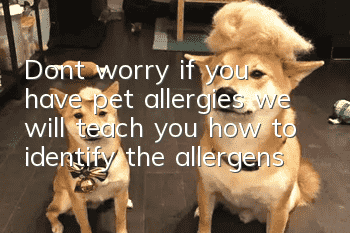Don’t worry if you have pet allergies, we will teach you how to identify the allergens

Having a pet is fun for a while, but pet allergies are not at all ambiguous. There are so many symptoms in a small body.
To this end, we classify pets as follows based on their allergens:
Parasite allergy
In addition to sucking blood, parasites can also leave saliva, excrement, etc. on the pet's skin, causing bacterial infections.
Mosquito bites will first cause itching, swelling and pain on the pet's skin. Secondly, they will also cause allergic dermatitis, causing skin redness, rash, hair loss, etc.
Therefore, in the spring and summer when such problems are prone to occur, we must pay attention to deworming and preventing mosquitoes for pets. For pets that have already developed skin symptoms, special products that can help improve and treat such symptoms should be used in conjunction with anti-inflammatory and anti-mosquito products. Itches, helps skin heal and regenerate.
Contact allergy
In this season, respiratory or skin allergy symptoms are basically caused by pollen, catkins, etc. If you want to prevent this, it is recommended to refer to the following aspects:
1. Reduce the chance of pets sneaking into flowers and other places, and do not let pets come into contact with flowers and green plants at home;
2. If you have a history of such allergies, please wear a pet mask when going out to prevent inhalation;
3. During this season, if your pet suddenly develops sneezing, coughing, skin allergies, etc., seek medical attention as soon as possible.
Pets may also be allergic to dust, dust mites, or even the owner’s clothing, bath soap and other daily necessities.
For this kind of question, please:
1. Avoid pets coming into contact with cleaning products containing chemical ingredients;
2. Pets’ nests and daily necessities that are frequently touched must be cleaned, dried and disinfected regularly;
3. Reduce the impact of indirectly brought back allergens on pets, such as parasite eggs hidden in the soles of shoes, pollen left on clothes, perfume smells that make pets uncomfortable, etc.;
Moderate exposure to the sun is good for health, but long-term or strong ultraviolet exposure can also cause allergic symptoms in pets, such as skin redness, swelling, itching, and scaling. This is the same as sunburn in humans, so:
A. Don’t trim your pet’s coat in summer, or simply shave it. You must know that the coat is the natural protective layer of the skin;
B. The skin is more susceptible to intense light exposure in summer. At this time, corresponding skin nutritional factors should be supplemented to improve skin condition;
- Erythromycin ointment to treat ear mites in dogs
- Why are so few people raising Schnauzers? Do you know the main reason?
- Prevention and treatment of canine transmissible gastroenteritis
- Reasons why dogs don’t grow taller
- Why did Alaska suddenly vomit? Analysis of the causes of vomiting in Alaska dogs!
- Tips for raising puppies
- How should dogs be trained? How to train dogs to do movements?
- How to differentiate between rabies and pseudorabies
- When should golden retriever puppies be weaned?
- Can the health of a Shiba Inu be judged by the color of its tongue? Dogs are healthy!



